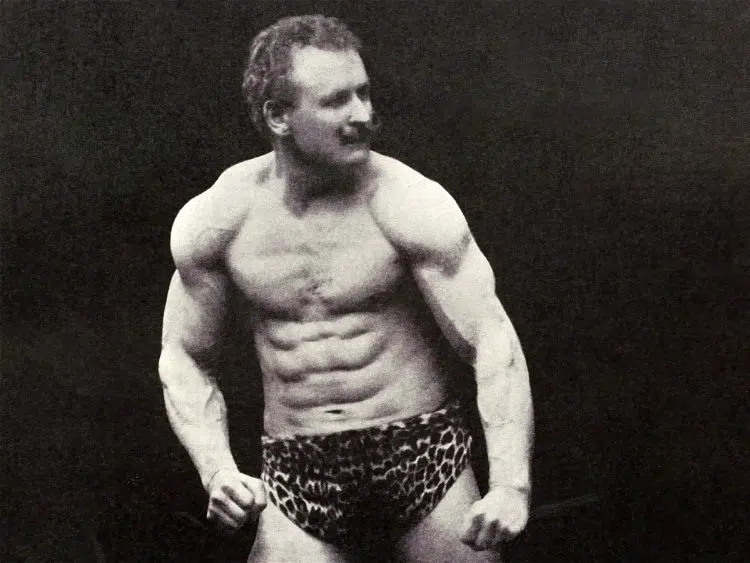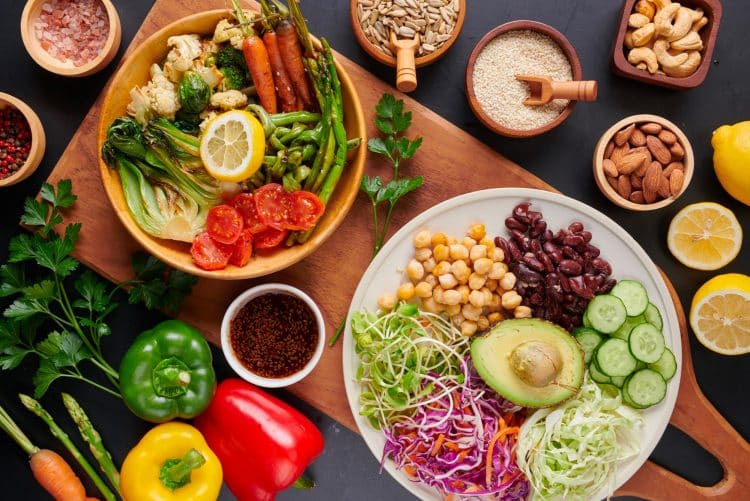Bodybuilding nutrition can often seem complicated, and the more we learn about eating for muscle growth, the less we seem to know. Hardly a week goes by without some new study revealing yet more information, leading to even greater confusion.
All this information overload can cause distress and even anxiety. After all, as most lifters know, training is only part of the muscle-building equation, and nutrition plays a critical role, too.
However, in my experience as a 30-year veteran personal trainer with a special interest in nutrition, your diet does not have to be complicated or perfect to fuel muscle growth. In fact, provided you follow some basic rules, you can achieve excellent results without obsessing over your diet.
This is largely due to the Pareto Principle, or the 80/20 rule as it’s often known.
The Pareto principle states that you get 80% of your results from 20% of your effort. Pareto’s Principle is more than a century old. It has proven true in many areas, including economics, farming, sociology, and politics. It also has a place in exercise and nutrition.
So, while things like macro ratios, nutrient timing, supplements, etc., are all valid dietary practices, they aren’t deal breakers. Their benefits are minimal, and you’ll get better results by focusing on what actually matters. Applying Pareto’s 80/20 Principle to your muscle-building diet will ensure you get the best results with the least effort.
So, inspired by Pareto, in this article, I share the only four nutrition rules you need to follow to build muscle.
Nutrition Rule #1 – Eat Protein at Every Meal

If there is one nutrient that bodybuilders care about, it’s protein. This makes sense, given that protein contains amino acids, which your body uses as building blocks for muscle tissue repair and growth.
It’s well known that consuming too little protein will undermine your progress, so many lifters obsess over this nutrient. Some use protein calculators to determine their exact protein requirements. They then weigh and measure their food to ensure they hit their protein target.
While your need for protein is undeniable, counting and weighing every gram you eat is usually unnecessary. Consuming less than the scientifically recommended amount won’t stop your gains, and there is actually a wide range of protein intakes that will build muscle.
For example, in a meta-study published by PubMed, protein intakes between 1.2 and 2.2 grams per kilogram of body weight resulted in significant muscle growth (1). That’s a considerable variance, which strongly suggests there is no perfect protein intake for muscle building.
So, free yourself from the protein-weighing trap by simply consuming protein at every meal. That means making meat, fish, poultry, eggs, dairy, etc., the cornerstone of your breakfast, lunch, and dinner. You can also snack on protein foods to add to your protein intake.
Related: Our List Of 40 Great Protein-Packed Foods
Without weighing or measuring anything, you’ll probably accumulate 160-200 grams of protein per day. This is more than enough to fuel muscle recovery and growth in most lifters.
Feel like you need a little more? Add 1-2 protein shakes per day. See – getting enough protein does not have to be complicated!
Takeaway: Forget weighing your protein or trying to consume a specific amount per pound or kilogram of body weight. Instead, just eat protein-rich foods at every meal and include high-protein snacks if you feel that you need more.
Nutrition Rule #2 – Eat Mostly Whole Foods
Bodybuilders and exercisers often take supplements to optimize their diets and plug any dietary gaps. Popular supplements include multivitamins and minerals, fish oils, amino acids, and other isolated nutrients. Some also take fiber supplements, such as psyllium husks.
However, you won’t need to take many, if any, supplements if you build your diet around what are commonly known as whole foods. Whole foods are foods found in nature that we then eat in very close to their unaltered state.
Examples of whole foods include:
Fruits
- Apples
- Bananas
- Berries (strawberries, blueberries, raspberries)
- Citrus fruits (oranges, lemons, grapefruits)
- Grapes
- Mangoes
- Melons (watermelon, cantaloupe, honeydew)
- Pears
- Pineapples
Vegetables
- Cruciferous vegetables (broccoli, cauliflower, Brussels sprouts)
- Cucumbers
- Green beans
- Leafy greens (spinach, kale, Swiss chard)
- Peppers (bell peppers, chili peppers)
- Root vegetables (carrots, sweet potatoes, beets)
- Squash (zucchini, butternut squash, pumpkin)
- Tomatoes
Whole Grains
- Barley
- Brown rice
- Bulgur
- Millet
- Oats
- Quinoa
- Rye
- Whole wheat (bread, pasta)
Nuts
- Almonds
- Brazil nuts
- Cashews
- Hazelnuts
- Macadamia nuts
- Pecans
- Pistachios
- Walnuts
Seeds
- Chia seeds
- Flaxseeds
- Hemp seeds
- Pumpkin seeds
- Sunflower seeds
Minimally-Processed Dairy
- Cheese (cheddar, mozzarella, Swiss, etc.)
- Cottage cheese
- Greek yogurt
- Kefir
- Plain yogurt
- Whole milk
Legumes
- Beans (black beans, kidney beans, navy beans)
- Chickpeas
- Lentils
- Peas
Lean Proteins
- Chicken breast
- Eggs
- Fish (salmon, trout, sardines)
- Lean cuts of beef and pork
- Turkey breast
Healthy Fats
- Avocados
- Coconut oil
- Extra virgin olive oil
- Olives
Eating more whole foods and less junk will load your diet with all the nutrients you need to be healthy and build muscle. Ultimately, there is no need to obsess over which supplements to buy with your hard-earned cash. Instead, take your money to the grocery store or farmer’s market and fuel your workouts with real food.
Takeaway: Build your diet around whole foods commonly found in nature and around the outside of most supermarkets. Natural foods contain all the vitamins, minerals, and fiber your body needs to be fit and healthy. Eating more whole foods means you won’t need to buy so many expensive nutritional supplements.
Related: Bodybuilding Without Supplements
Nutrition Rule #3 – Add A Meal to Gain Weight, Skip A Meal to Lose It
Bulking, cutting, and body recomposition are probably the most complex nutritional challenges bodybuilders face. According to many experts, losing fat, building mass, or gaining muscle while shedding fat requires specific dietary approaches. Some even say that your macro ratios (the relationship between protein, fat, and carbs) must change according to your goal.
To all of that, I say, “Poppycock!”
While it’s clear that strictly controlling kilocalories and macros works, it’s a very difficult thing to do. Sure, elite bodybuilders must make precise changes to their diet to achieve their incredible physiques. But let’s be honest: very few of us will ever be in that position. Instead, we just want to build some muscle or get a little leaner beach season!
My Pareto-inspired solution to bulking and cutting is simple – just add a meal per day to gain weight and eat one less meal a day to get leaner.
Using this approach, there is no need to count kilocalories or measure macros.
Golden-ere bodybuilders didn’t count kilocalories or macros. Instead, they just ate a little more when they wanted to gain weight and a little less when they needed to lose fat. Bodybuilding legend Arnold Schwarzenegger called this “turning the dial,” and it’s as simple as it is effective.
Monitor your weight and your waistline and make adjustments to your diet as needed. For example, if you aren’t gaining weight as fast as you’d like, add an extra snack to your daily food intake. Conversely, if your weight loss has stalled, reduce the size of your remaining meals or eliminate a snack.
As well as being incredibly simple, this sort of intuitive dieting will reconnect you with your appetite, teaching you how to control your weight forever. In other words – no more diets!
Takeaway: Stop worrying so much about kilocalories and macros. Simply eat a little more if you want to gain weight and a little less to lose it. This intuitive approach to weight management is how bronze, silver, and golden era bodybuilders did things, and they’re much leaner and more muscular than you are, so follow their example!
Nutrition Rule #4 – Make Water Your Primary Beverage
Ask the average person how much liquid they drink in a day, and they’ll probably tell you that it’s eight cups or about 64 fluid ounces. But, ask that same person how much of that was water, and the answer will be much lower.
That’s because most people consume lots of soda, coffee, tea, fruit juice, energy drinks, smoothies, and other beverages.
While all those other drinks are somewhat hydrating and can help slake your thirst, they don’t provide your body with what it really needs to be fit, strong, and healthy, which is good old H2O, better known as water.
Your body comprises roughly 60% water, and water is involved in almost every action and reaction that keeps your body running smoothly. It helps keep you cool, lubricates your digestive system and respiratory passages, and makes up most of your blood volume. And yet, despite how critical it is, many people avoid water and drink manufactured beverages instead.
Water is the ultimate hydrator. It’s naturally calorie, sugar, and caffeine-free and is the original diet beverage. Water is also widely available and, in many cases, it’s free. Therefore, the question isn’t why drink more water, but why not?
Additional benefits of drinking plain water include:
- Aids in weight management
- Better physical performance
- Body temperature regulation
- Boosts immune system
- Enhanced digestive health
- Improved cognitive function
- Increased energy
- Promotes healthy skin
- Reduces fatigue and boosts energy levels
- Supports joint health
So, how much water should you drink? You can determine your ideal water intake with this calculator. But, to keep things as simple as possible, I recommend just drinking little and often. Drink water when you are thirsty and not soda or juice.
There is no need to quit coffee and smoothies, but I tend not to count these drinks toward my total water intake. So, if I tell you that I drank 64 fluid ounces yesterday, I mean that’s how much water I had and not how much tea or soda. Following this rule usually leads to a lower consumption of other beverages, which is a valuable side effect.
Takeaway: Drink more water and less soda, fruit juice, energy drinks, etc. Plain water is what your body needs, and not chemical-infused, artificially sweetened, or colored beverages. Drinking more water is good for every aspect of your fitness and health, including muscle building. Drink little and often to stay hydrated.
Closing Thoughts
Nutritional science has come a long way over the last few decades, and we’ve all got access to tons of new information. While this can sometimes be useful, in other cases, it’s just noise and distraction. Extra information makes you focus on the small things when most of your results come from the big things.
Bodybuilding nutrition doesn’t have to be complicated. In fact, the simpler you make it, the more likely you are to do what’s necessary to achieve your muscle mass and body composition goals. There is certainly no need to obsess over every detail of your diet, which is usually more trouble than it’s worth and has very little impact on your progress.

Think that you can’t build muscle without counting kilocalories or manipulating macros? Well, think again! Bronze, silver, and golden era bodybuilders achieved phenomenal results without obsessing over their diets. They did it, and so can you!
Put these Pareto Principle-inspired rules into action. You’ll soon be on your way to achieving the body of your dreams with a whole lot less effort and stress.
References:
- Nunes EA, Colenso-Semple L, McKellar SR, Yau T, Ali MU, Fitzpatrick-Lewis D, Sherifali D, Gaudichon C, Tomé D, Atherton PJ, Robles MC, Naranjo-Modad S, Braun M, Landi F, Phillips SM. Systematic review and meta-analysis of protein intake to support muscle mass and function in healthy adults. J Cachexia Sarcopenia Muscle. 2022 Apr;13(2):795-810. doi: 10.1002/jcsm.12922. Epub 2022 Feb 20. PMID: 35187864; PMCID: PMC8978023.
Tip: If you're signed in to Google, tap Follow.












